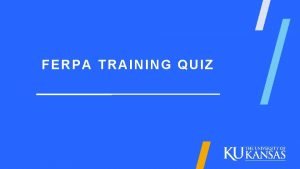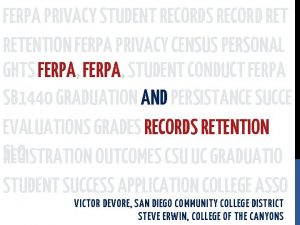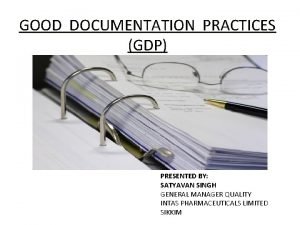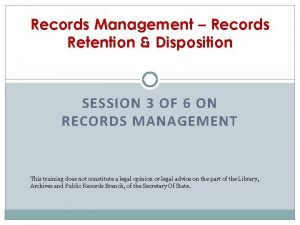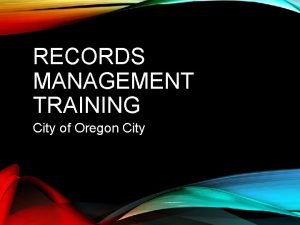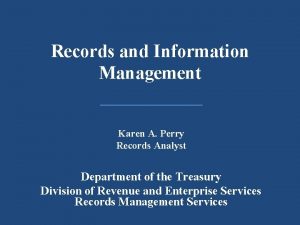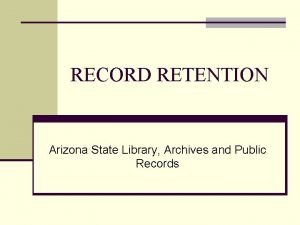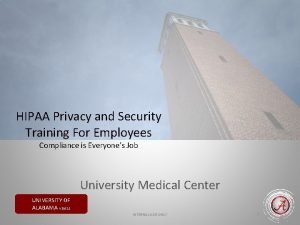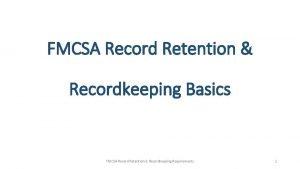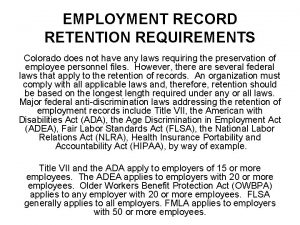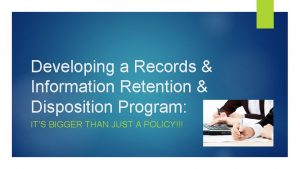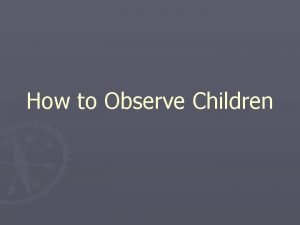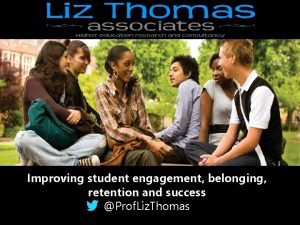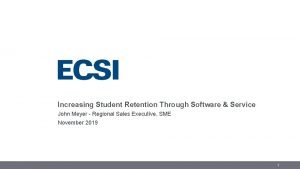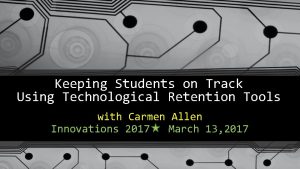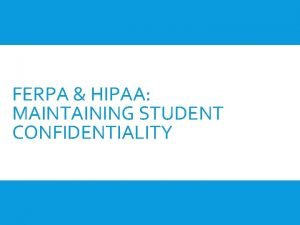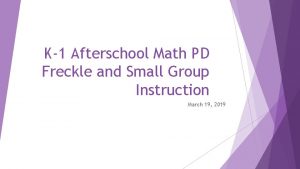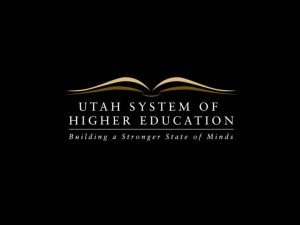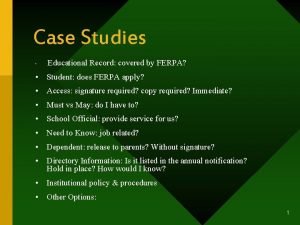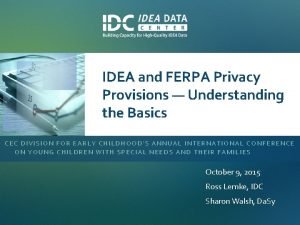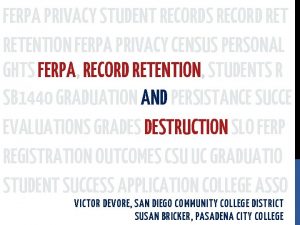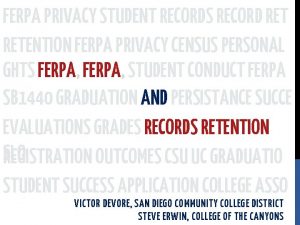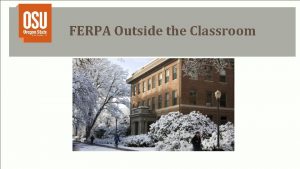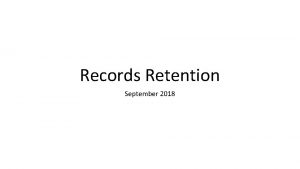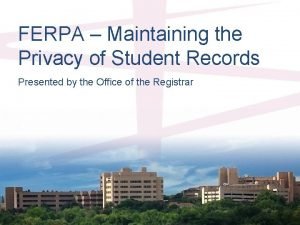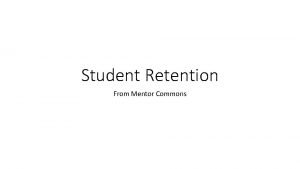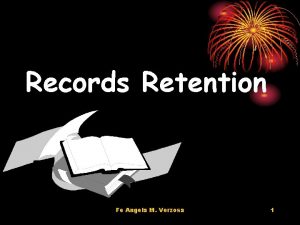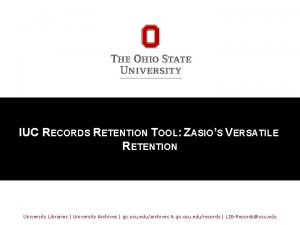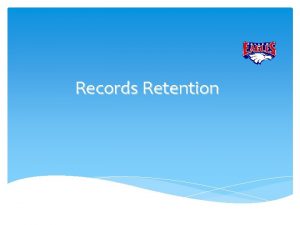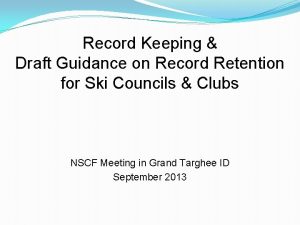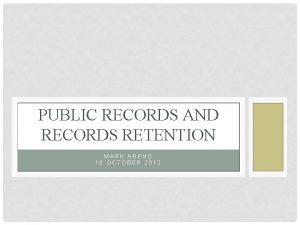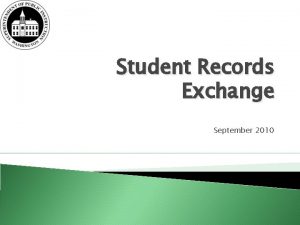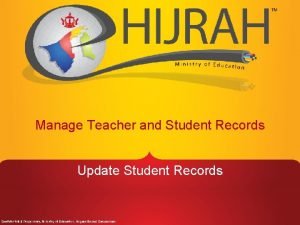FERPA PRIVACY STUDENT RECORDS RECORD RETENTION FERPA PRIVACY




























- Slides: 28

FERPA PRIVACY STUDENT RECORDS RECORD RETENTION FERPA PRIVACY CENSUS PERSONAL GHTS FERPA, STUDENT CONDUCT FERPA SB 1440 GRADUATION AND PERSISTANCE SUCCE EVALUATIONS GRADES IMPORTANT FERPA SLO REGISTRATION OUTCOMES CSU UC GRADUATIO STUDENT SUCCESS APPLICATION COLLEGE ASSO VICTOR DEVORE, SUPERVISOR ADMISSIONS AND RECORDS CUYAMACA COLLEGE

2 WHAT IS FERPA?

FERPA stands for the Family Educational Rights and Privacy Act of 1974 FERPA is a Federal Law that is designed to protect the privacy of education records, to establish the right of students to inspect and review their education records, and to provide guidelines for the correction of inaccurate and misleading data through informal and formal hearings. 3 FERPA is enforced by the Family Policy Compliance Office, U. S. Department of Education, Washington DC

THE ESSENCE OF THE ACT 1) College students must be permitted to inspect their own education records. 4 2) School officials may not disclose personally identifiable information about students nor permit inspection of their records without written permission unless such action is covered by certain exceptions permitted by the Act.

KEY TERMS AND CONCEPTS • Education Record • Directory Information • School Official • Legitimate Educational Interest • Prior Consent to Disclosure 5 • Students’ right to access their education records as outlined in the College Catalog and College Website

WHAT IS AN “EDUCATION RECORD? ” 6 Any record, with certain exceptions, maintained by an institution that is directly related to a student or students. This record can contain a student’s name(s) or information from which an individual student can be personally identified.

WHAT IS NOT AN EDUCATION RECORD? “Sole Possession” notes Law enforcement unit records Financial records of the student’s parents Records maintained exclusively for individuals in their capacity as employees • Medical & Treatment records (HIPAA) • Alumni Records 7 • •

WHAT IS “PERSONALLY IDENTIFIABLE? ” Personally Identifiable means data or information which includes: 1) The name of the student, the student’s parent, or other family members. 2) The student’s campus or home address; 3) A personal identifier (such as a social security number or student number) 8 4) A list of personal characteristics or other information which would make the student’s identity known with “reasonable certainty”

GRADES POSTED OUTSIDE OF PROFESSOR’S OFFICE WITH STUDENT ID? 9 NO

WHAT IS DIRECTORY INFORMATION? Although not required to be included in the institution’s annual notification, the institution must notify students of what information the institution has designated as directory information. The Family Policy Compliance Office has recommended that this notification be part of the institution’s annual FERPA notification to students. 10 Students may opt-out of directory information being published.

WHAT IS DIRECTORY INFORMATION? Some of the following are possible items that a college may designate as directory information: • Name, address, phone number, email address, dates of attendance and enrollment status (full-time, half-time) • Student participation in officially recognized activities and sports including weight, height, and high school of graduation of athletic team members 11 • Degrees and awards received by students, including honors, scholarship awards, athletic wards, Vice President’s and President’s recognition.

WHAT CAN NEVER BE DIRECTORY INFORMATION? Directory information can never include the following: • Race, gender, ethnicity, sexual orientation • SSN • Grades • GPA • Citizenship • Student ID Numbers (unless used as a login combined with password/pin; may include ID badges but must require a second authentication feature. ) 12 • Religion

SCHOOL OFFICIALS A school official can be a person: 1. Employed by the college in an administrative, supervisory, academic, research, or support staff position (including law enforcement and health staff personnel), 2. Elected to the Board of Trustees, 4. Serving as a student representative on an official committee, such as a disciplinary committee, or assisting another school official in performing his or her tasks. (Teacher’s Assistants) 13 3. Or a company employed by or under contract to the college to perform a specific task, such as, an agent, an attorney, an auditor, or an outsourced service provider. (e. g. San Diego County Sheriff)

LEGITIMATE EDUCATIONAL INTEREST The demonstrated need to know by those officials of an institution who act in the student’s educational interest, including faculty, administrators, clerical and professional employees, and other persons who manage student record information. 14 Although FERPA does not define “legitimate educational interest”, it states that institutions must specify the criteria for determining it.

INSPECTION AND REVIEW Students have the right to see everything in their “education record” except: • Information about other students; • Financial records of parents; and • Confidential letters of recommendation if they waive their right of access 15 FERPA does not prescribe what records are created or how long they are kept. However you cannot destroy a record if there is a request to inspect and review. It is important to know and understand the district’s records retention policy. (Ref. BP/AP 3310)

RIGHT TO CONSENT TO DISCLOSURE Students have the right to control to whom his or her education record is released. The college must keep all written consents on file for a minimum of three years. 16 There are exceptions….

WHEN IS PRIOR CONSENT NOT REQUIRED? Institutions may disclose records without consent if certain requirements are met, but it is not required to do so. Some examples: • “School officials” with a “legitimate educational interest. ” Employees and legal agents have access to education records in order to perform their official, educationallyrelated duties • Disclosure to organizations conducting studies to improve instruction, or to accrediting organizations. • Disclosure to parents of dependent students (IRS definition); Parents must file a certification of dependency e. g. income taxes 17 • Judicial Order or lawfully issued subpoena

WHEN IS PRIOR CONSENT NOT REQUIRED? (CONT’D) Institutions may disclose records without consent if certain requirements are met, but it is not required to do so. Some examples: • Disclosure of health/safety emergency (must document what the emergency was and to whom the information was released. ) 18 • Disclosure of directory information, provided the student has not “opt-out” of direction information.

WHEN IS PRIOR CONSENT NOT REQUIRED? (CONT’D) Solomon Act: 19 The Act allows military organizations access to information ordinarily restricted under FERPA for the purpose of military recruiting. The Solomon Amendment permits Department of Defense entities to physically access institutional facilities to recruit students, and to obtain students' names, addresses, phone numbers, age, class, and degree program once every term. Institutions are exempt from these requirements if they do not collect this information, or if they do not normally provide this information to prospective employers. The Solomon Amendment only applies to enrolled students over the age 17.

WHEN IS PRIOR CONSENT NOT REQUIRED? (CONT’D) Solomon Act: 20 Institutions that violate the Solomon Amendment risk loss of funding from several federal agencies, including the Departments of Defense, Education, Health and Human Services, and Labor. If a component of the institution violates the Solomon Amendment, larger system funding may be affected.

REQUIREMENTS FOR COMPLIANCE Institutions must provide an annual notification to students of their FERPA rights. • • • Right to Inspect Right to amend and challenge Opt out of directory information Complaint process with US Do. E Criteria for school officials & legitimate educational interest when disclosing information without prior consent. 21 Must provide students access to their education records (Keep in mind state = 15 days vs federal = 45 days)

22 SPECIFIC ISSUES

DIRECTORY INFORMATION EXAMPLE Your college designates name, address, telephone numbers, email address, and honors and awards received as directory information. A non-profit organization that serves disabled students asks your college for directory information on students who are enrolled in DSPS. Can the names and contact information of your DSPS students be disclosed to the organization as directory information? 23 No. You cannot link directory information with an item that cannot be designated as directory information, such as disability status.

STUDENT LEARNING OUTCOMES Administrators and faculty with a legitimate educational interest may have access to education records. Please note that the faculty or staff must have a reason to access the information in order to perform their educationally-related duties. “Good” Example Math Department Chair asking for GPA records for all students who took MATH-103 and MATH-110 and if they progressed to Pre-Calculus. “Bad” Example 24 Business Faculty requesting contact and GPA records for all students who are over the age of 24 and in Intercollegiate sports.

FERPA, MINORS AND CONCURRENT ENROLLMENT Linda, who is 17, is still in high school but is also taking classes at your college. Have FERPA rights transferred to Linda? Yes. Can her parents see the records at your college? Not unless an exception allows it, e. g. , claiming little Linda on their income taxes. 25 Is there another way the parents might see these records?

WHAT ABOUT PARENTS? 26 When a student reaches the age of 18 or begins attending a postsecondary institution regardless of age, FERPA rights transfer to the student.

Institutions may disclose education records of students to their parents by any of the following: 27 1. By obtaining the student’s written consent 2. By having the parents establish the student’s dependency as defined by Internal Revenue Code 3. By exercising its disclosure option on any students under age 21 regarding a violation of an institutional rule or federal, state, or local law regarding the use of alcohol or controlled substance as long as state law permits. 4. In a health or safety emergency.

28 Q&A?
 Ferpa quiz
Ferpa quiz Ferpa meaning
Ferpa meaning Iso good documentation practices
Iso good documentation practices Nara records retention policy
Nara records retention policy Oregon public records retention schedule
Oregon public records retention schedule Artemis records retention
Artemis records retention Arizona records retention schedule
Arizona records retention schedule Cvs privacy awareness and hipaa training answers
Cvs privacy awareness and hipaa training answers Fmcsr 396
Fmcsr 396 Colorado employee record retention requirements
Colorado employee record retention requirements Record retention meaning
Record retention meaning Specimen record observation
Specimen record observation A sense of belonging improving student retention
A sense of belonging improving student retention Best practices in student retention
Best practices in student retention John meyer pittsburgh pa
John meyer pittsburgh pa Student retention tools
Student retention tools What works student retention and success
What works student retention and success Maintaining student privacy
Maintaining student privacy Broken record strategy for redirecting student behavior
Broken record strategy for redirecting student behavior What did you do in london last weekend
What did you do in london last weekend Https://student.freckle.com/#/fact-practice
Https://student.freckle.com/#/fact-practice Clearinghouse student tracker
Clearinghouse student tracker Hello good morning students
Hello good morning students Class maths student student1 class student string name
Class maths student student1 class student string name Sls learning login
Sls learning login Tell me about your last weekend
Tell me about your last weekend National student clearinghouse student tracker
National student clearinghouse student tracker Ferpa case studies
Ferpa case studies Ferpa
Ferpa
